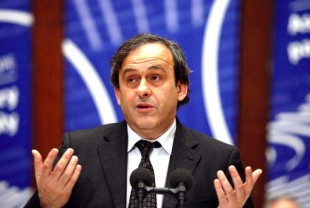

Qatar 2022 World Cup to benefit entire region

The entire GCC will participate in and reap the rewards of the 2022 FIFA World Cup, the acting chief executive of Bahrain's Economic Development Board said.
Kamal bin Ahmed's comment comes a day after the head of European football said he would only support Qatar hosting the World Cup if its neighbouring countries were included.
“The neighbouring emirates must be included so that the World Cup is staged throughout the entire region,” UEFA head Michel Platini told Bild newspaper.
Critics have questioned whether Qatar has the necessary infrastructure to stage the event and countries including Saudi Arabia, the UAE, Bahrain, Oman and Kuwait could be called upon to help by hosting matches and providing accommodation for the massive number of fans expected to attend.
FIFA secretary general Jerome Valcke said there was still plenty of time to determine the logistics of the 2022 World Cup, leaving open the possibility of it being spread across the region.
During a Euromoney conference in Manama, Bin Ahmed made it clear he was interested in Bahrain played a part.
“In the next decade, international attention will increasingly focus here on the region – not least when the FIFA World Cup comes in 2022,” he said.
“It offers a real opportunity for the GCC as a whole to put in place the foundations for an economy that will create prosperity for the long-term.”
Bin Ahmed said too often Gulf countries were compared against each other and were too occupied with competition to cooperate on large scale projects, such as the World Cup.
“When people approach the growth of economic diversification in the region, all too often, the question they ask is: which country is winning? This zero-sum approach suggests that only one country can thrive, and that any growth needs to come at the expense of others,” he told a Euromoney conference in Manama.
“However, the GCC is an economic group that is becoming increasingly well-integrated – two fifths of Bahrain’s non-oil exports go to the rest of the GCC and the same is true of over half of Oman’s non-oil exports, 30 per cent of Saudi Arabia’s and around a quarter of UAE’s. So it’s clear that growth in one country in the region – and particularly the success of important economic diversification projects – is increasingly tied to growth elsewhere in the region.”